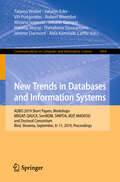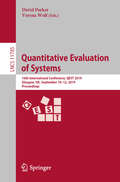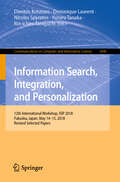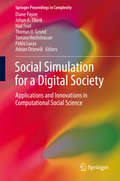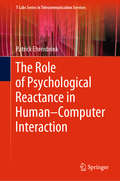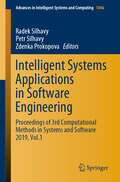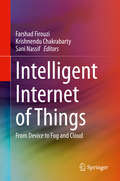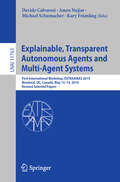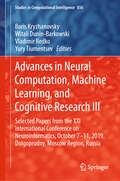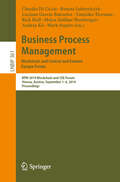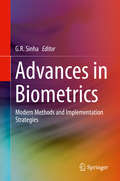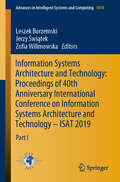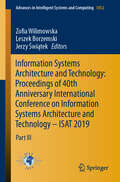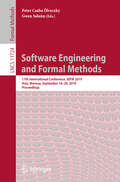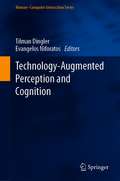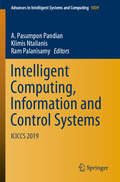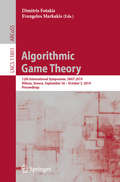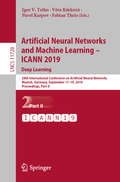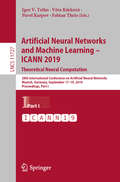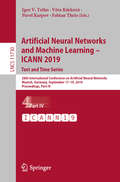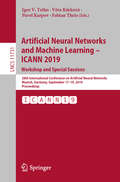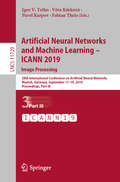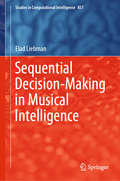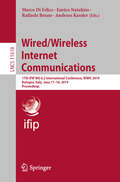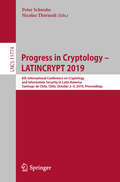- Table View
- List View
New Trends in Databases and Information Systems: ADBIS 2019 Short Papers, Workshops BBIGAP, QAUCA, SemBDM, SIMPDA, M2P, MADEISD, and Doctoral Consortium, Bled, Slovenia, September 8–11, 2019, Proceedings (Communications in Computer and Information Science #1064)
by Tatjana Welzer Johann Eder Vili Podgorelec Robert Wrembel Mirjana Ivanović Johann Gamper Mikoƚaj Morzy Theodoros Tzouramanis Jérôme Darmont Aida Kamišalić LatifićThis book constitutes the thoroughly refereed short papers, workshops and doctoral consortium papers of the 23rd European Conference on Advances in Databases and Information Systems, ADBIS 2019, held in Bled, Slovenia, in September 2019.The 19 short research papers and the 5 doctoral consortium papers were carefully reviewed and selected from 103 submissions, and the 31 workshop papers were selected out of 67 submitted papers. The papers are organized in the following sections: Short Papers; Workshops Papers; Doctoral Consortium Papers; and cover a wide spectrum of topics related to database and information systems technologies for advanced applications.
Quantitative Evaluation of Systems: 16th International Conference, QEST 2019, Glasgow, UK, September 10–12, 2019, Proceedings (Lecture Notes in Computer Science #11785)
by David Parker Verena WolfThis book constitutes the proceedings of the 16th International Conference on Quantitative Evaluation Systems, QEST 2019, held in Glasgow, UK, in September 2019.The 17 full papers presented together with 2 short papers were carefully reviewed and selected from 40 submissions. The papers cover topics in the field of Probabilistic Verification; Learning and Verification; Hybrid Systems; Security; Probabilistic Modelling and Abstraction; and Applications and Tools.
Information Search, Integration, and Personalization: 12th International Workshop, ISIP 2018, Fukuoka, Japan, May 14–15, 2018, Revised Selected Papers (Communications in Computer and Information Science #1040)
by Dimitris Kotzinos Dominique Laurent Nicolas Spyratos Yuzuru Tanaka Rin-Ichiro TaniguchiThis book constitutes the revised selected papers of the 12th International Workshop on Information Search, Integration and Personalization, ISIP 2018, held in Fukuoka, Japan, in May 2018.The volume presents 1 invited paper as well as 7 revised full papers, which were carefully reviewed and selected from 13 papers submitted to these post-conference proceedings. The papers are organized in topical sections on data integration; text and document management; advanced data mining techniques.
Social Simulation for a Digital Society: Applications and Innovations in Computational Social Science (Springer Proceedings in Complexity)
by Diane Payne Johan A. Elkink Nial Friel Thomas U. Grund Tamara Hochstrasser Pablo Lucas Adrian Ottewill“Social Simulation for a Digital Society” provides a cross-section of state-of-the-art research in social simulation and computational social science. With the availability of big data and faster computing power, the social sciences are undergoing a tremendous transformation. Research in computational social sciences has received considerable attention in the last few years, with advances in a wide range of methodologies and applications. Areas of application of computational methods range from the study of opinion and information dynamics in social networks, the formal modeling of resource use, the study of social conflict and cooperation to the development of cognitive models for social simulation and many more. This volume is based on the Social Simulation Conference of 2017 in Dublin and includes applications from across the social sciences, providing the reader with a demonstration of the highly versatile research in social simulation, with a particular focus on public policy relevance in a digital society. Chapters in the book include contributions to the methodology of simulation-based research, theoretical and philosophical considerations, as well as applied work. This book will appeal to students and researchers in the field.
The Role of Psychological Reactance in Human–Computer Interaction (T-Labs Series in Telecommunication Services)
by Patrick EhrenbrinkThis book provides an in-depth investigation on the psychological phenomenon "reactance“ in the context of Human-Computer Interaction (HCI). The author argues that the complexity and autonomy of modern technology can sometimes be overwhelming and can then be perceived as a threat to freedom by its users, thereby diminishing acceptance. The book investigates if and how this is the case and provides strategies to regain the lost acceptance. Topics include relevance of reactance on HCI, triggers for reactance, consequences of reactance, measurement of reactance, and countermeasures to reactance.
Intelligent Systems Applications in Software Engineering: Proceedings of 3rd Computational Methods in Systems and Software 2019, Vol. 1 (Advances in Intelligent Systems and Computing #1046)
by Radek Silhavy Petr Silhavy Zdenka ProkopovaThis book presents real-world problems and exploratory research that describes novel approaches in software engineering, cybernetics and algorithms in the context of intelligent systems. It constitutes the refereed proceedings of the 3rd Computational Methods in Systems and Software 2019 (CoMeSySo 2019) conference, a groundbreaking online conference that provides an international forum for discussing the latest high-quality research results.
Intelligent Internet of Things: From Device to Fog and Cloud
by Krishnendu Chakrabarty Farshad Firouzi Sani NassifThis holistic book is an invaluable reference for addressing various practical challenges in architecting and engineering Intelligent IoT and eHealth solutions for industry practitioners, academic and researchers, as well as for engineers involved in product development. The first part provides a comprehensive guide to fundamentals, applications, challenges, technical and economic benefits, and promises of the Internet of Things using examples of real-world applications. It also addresses all important aspects of designing and engineering cutting-edge IoT solutions using a cross-layer approach from device to fog, and cloud covering standards, protocols, design principles, reference architectures, as well as all the underlying technologies, pillars, and components such as embedded systems, network, cloud computing, data storage, data processing, big data analytics, machine learning, distributed ledger technologies, and security. In addition, it discusses the effects of Intelligent IoT, which are reflected in new business models and digital transformation. The second part provides an insightful guide to the design and deployment of IoT solutions for smart healthcare as one of the most important applications of IoT. Therefore, the second part targets smart healthcare-wearable sensors, body area sensors, advanced pervasive healthcare systems, and big data analytics that are aimed at providing connected health interventions to individuals for healthier lifestyles.
Explainable, Transparent Autonomous Agents and Multi-Agent Systems: First International Workshop, EXTRAAMAS 2019, Montreal, QC, Canada, May 13–14, 2019, Revised Selected Papers (Lecture Notes in Computer Science #11763)
by Davide Calvaresi Amro Najjar Michael Schumacher Kary FrämlingThis book constitutes the proceedings of the First International Workshop on Explainable, Transparent Autonomous Agents and Multi-Agent Systems, EXTRAAMAS 2019, held in Montreal, Canada, in May 2019. The 12 revised and extended papers presented were carefully selected from 23 submissions. They are organized in topical sections on explanation and transparency; explainable robots; opening the black box; explainable agent simulations; planning and argumentation; explainable AI and cognitive science.
Advances in Neural Computation, Machine Learning, and Cognitive Research III: Selected Papers from the XXI International Conference on Neuroinformatics, October 7-11, 2019, Dolgoprudny, Moscow Region, Russia (Studies in Computational Intelligence #856)
by Boris Kryzhanovsky Witali Dunin-Barkowski Vladimir Redko Yury TiumentsevThis book describes new theories and applications of artificial neural networks, with a special focus on answering questions in neuroscience, biology and biophysics and cognitive research. It covers a wide range of methods and technologies, including deep neural networks, large scale neural models, brain computer interface, signal processing methods, as well as models of perception, studies on emotion recognition, self-organization and many more. The book includes both selected and invited papers presented at the XXI International Conference on Neuroinformatics, held on October 7-11, 2019, in Dolgoprudny, a town in Moscow region, Russia.
Business Process Management: BPM 2019 Blockchain and CEE Forum, Vienna, Austria, September 1–6, 2019, Proceedings (Lecture Notes in Business Information Processing #361)
by Claudio Di Ciccio Renata Gabryelczyk Luciano García-Bañuelos Tomislav Hernaus Rick Hull Mojca Indihar Štemberger Andrea Kő Mark StaplesThis book constitutes the contributions presented at the Blockchain Forum and the Central and Eastern Europe Forum (CEE Forum) held at the 17th International Conference on Business Process Management, BPM 2019, which took place in Vienna, Austria, in September 2019.The Blockchain Forum deals with the use of blockchain for collaborative information systems. Conceptual, technical and application-oriented contributions are pursued within the scope of this theme. The Blockchain Forum received a total of 31 submissions; 10 full and 1 short paper were accepted for publication in this book. The objective of the CEE Forum is to foster discussion for BPM academics from Central and Eastern Europe to disseminate their research, compare results and share experiences. For the CEE Forum 16 submissions were received and 6 full and 2 short papers were accepted for publication.The book also contains one invited talk in full-paper length and 6 poster papers from the CEE Forum.
Advances in Biometrics: Modern Methods and Implementation Strategies
by G. R. SinhaThis book provides a framework for robust and novel biometric techniques, along with implementation and design strategies. The theory, principles, pragmatic and modern methods, and future directions of biometrics are presented, along with in-depth coverage of biometric applications in driverless cars, automated and AI-based systems, IoT, and wearable devices. Additional coverage includes computer vision and pattern recognition, cybersecurity, cognitive computing, soft biometrics, and the social impact of biometric technology. The book will be a valuable reference for researchers, faculty, and practicing professionals working in biometrics and related fields, such as image processing, computer vision, and artificial intelligence.Highlights robust and novel biometrics techniquesProvides implementation strategies and future research directions in the field of biometricsIncludes case studies and emerging applications
Information Systems Architecture and Technology: Part I (Advances in Intelligent Systems and Computing #1050)
by Leszek Borzemski Jerzy Świątek Zofia WilimowskaThis three-volume book highlights significant advances in the development of new information systems technologies and architectures. Further, it helps readers solve specific research and analytical problems and glean useful knowledge and business value from data. Each chapter provides an analysis of a specific technical problem, followed by a numerical analysis, simulation, and implementation of the solution to the real-world problem. Managing an organization, especially in today’s rapidly changing environment, is a highly complex process. Increased competition in the marketplace, especially as a result of the massive and successful entry of foreign businesses into domestic markets, changes in consumer behaviour, and broader access to new technologies and information, calls for organisational restructuring and the introduction and modification of management methods using the latest scientific advances. This situation has prompted various decision-making bodies to introduce computer modelling of organization management systems. This book presents the peer-reviewed proceedings of the 40th Anniversary International Conference “Information Systems Architecture and Technology” (ISAT), held on September 15–17, 2019, in Wrocław, Poland. The conference was organised by the Computer Science Department, Faculty of Computer Science and Management, Wroclaw University of Sciences and Technology, and University of Applied Sciences in Nysa, Poland. The papers have been grouped into three major sections: Part I—discusses topics including, but not limited to, artificial intelligence methods, knowledge discovery and data mining, big data, knowledge-based management, Internet of Things, cloud computing and high-performance computing, distributed computer systems, content delivery networks, and service-oriented computing. Part II—addresses various topics, such as system modelling for control, recognition and decision support, mathematical modelling in computer system design, service-oriented systems, and cloud computing, and complex process modelling. Part III—focuses on a number of themes, like knowledge-based management, modelling of financial and investment decisions, modelling of managerial decisions, production systems management, and maintenance, risk management, small business management, and theories and models of innovation.
Information Systems Architecture and Technology: Part III (Advances in Intelligent Systems and Computing #1052)
by Zofia Wilimowska Leszek Borzemski Jerzy ŚwiątekThis three-volume book highlights significant advances in the development of new information systems technologies and architectures. Further, it helps readers solve specific research and analytical problems and glean useful knowledge and business value from data. Each chapter provides an analysis of a specific technical problem, followed by a numerical analysis, simulation, and implementation of the solution to the real-world problem.Managing an organization, especially in today’s rapidly changing environment, is a highly complex process. Increased competition in the marketplace, especially as a result of the massive and successful entry of foreign businesses into domestic markets, changes in consumer behaviour, and broader access to new technologies and information, calls for organisational restructuring and the introduction and modification of management methods using the latest scientific advances. This situation has prompted various decision-making bodies to introduce computer modelling of organization management systems.This book presents the peer-reviewed proceedings of the 40th Anniversary International Conference “Information Systems Architecture and Technology” (ISAT), held on September 15–17, 2019, in Wrocław, Poland. The conference was organised by the Computer Science Department, Faculty of Computer Science and Management, Wroclaw University of Sciences and Technology, and University of Applied Sciences in Nysa, Poland. The papers have been grouped into three major sections:Part I—discusses topics including, but not limited to, artificial intelligence methods, knowledge discovery and data mining, big data, knowledge-based management, Internet of Things, cloud computing and high-performance computing, distributed computer systems, content delivery networks, and service-oriented computing.Part II—addresses various topics, such as system modelling for control, recognition and decision support, mathematical modelling in computer system design, service-oriented systems, and cloud computing, and complex process modelling.Part III—focuses on a number of themes, like knowledge-based management, modelling of financial and investment decisions, modelling of managerial decisions, production systems management, and maintenance, risk management, small business management, and theories and models of innovation.
Software Engineering and Formal Methods: 17th International Conference, SEFM 2019, Oslo, Norway, September 18–20, 2019, Proceedings (Lecture Notes in Computer Science #11724)
by Peter Csaba Ölveczky Gwen SalaünThis book constitutes the refereed proceedings of the 17th International Conference on Software Engineering and Formal Methods, SEFM 2019, held in Oslo, Norway, in September 2019.The 27 full papers presented were carefully reviewed and selected from 89 submissions. The papers cover a large variety of topics, including testing, formal verification, program analysis, runtime verification, malware and attack detection,and software development and evolution and address a wide range of systems, such as cyber-physical systems, UAVs, autonomous robots, and feature-oriented and operating systems. They are organized in the following topical sections: cooperative asynchronous systems; cyber-physical systems; feature-oriented and versioned systems; model-based testing; model inference; ontologies and machine learning; operating systems; program analysis; relating models and implementations; runtime verification; security; and verification.
Technology-Augmented Perception and Cognition (Human–Computer Interaction Series)
by Tilman Dingler Evangelos NiforatosTools and technologies have long complemented and extended our physical abilities: from pre-historic spearheads to steam-propelled ploughs and high-tech prosthetics. While the development of lenses granted us insights into the micro and macrocosms, new sensors and technologies increasingly augment our cognitive abilities, including memory and perception. This book integrates current research efforts, results, and visions from the fields of computer science, neuroscience, and psychology. It provides a comprehensive overview of the state-of-the-art and future applications of how technologies assist and augment human perception and cognition. Experts in the field share their research and findings on: Working memory enhancementsDigitization of memories through lifelog archivesThe consequences of technology-induced disruptions and forgettingThe creation and utilization of new human senses Ethical and security concerns that arise with augmentation technologies. As technology weaves itself ever deeper into our lives, careful examination of its capabilities, risks and benefits is warranted. While this book focuses on the complementation and augmentation of human capabilities, it serves as a foundation for students, researchers and designers of technologies that push the boundaries of perception and cognition.
Intelligent Computing, Information and Control Systems: ICICCS 2019 (Advances in Intelligent Systems and Computing #1039)
by Klimis Ntalianis A. Pasumpon Pandian Ram PalanisamyFrom past decades, Computational intelligence embraces a number of nature-inspired computational techniques which mainly encompasses fuzzy sets, genetic algorithms, artificial neural networks and hybrid neuro-fuzzy systems to address the computational complexities such as uncertainties, vagueness and stochastic nature of various computational problems practically. At the same time, Intelligent Control systems are emerging as an innovative methodology which is inspired by various computational intelligence process to promote a control over the systems without the use of any mathematical models. To address the effective use of intelligent control in Computational intelligence systems, International Conference on Intelligent Computing, Information and Control Systems (ICICCS 2019) is initiated to encompass the various research works that helps to develop and advance the next-generation intelligent computing and control systems. This book integrates the computational intelligence and intelligent control systems to provide a powerful methodology for a wide range of data analytics issues in industries and societal applications. The recent research advances in computational intelligence and control systems are addressed, which provide very promising results in various industry, business and societal studies. This book also presents the new algorithms and methodologies for promoting advances in common intelligent computing and control methodologies including evolutionary computation, artificial life, virtual infrastructures, fuzzy logic, artificial immune systems, neural networks and various neuro-hybrid methodologies. This book will be pragmatic for researchers, academicians and students dealing with mathematically intransigent problems. It is intended for both academicians and researchers in the field of Intelligent Computing, Information and Control Systems, along with the distinctive readers in the fields of computational and artificial intelligence to gain more knowledge on Intelligent computing and control systems and their real-world applications.
Algorithmic Game Theory: 12th International Symposium, SAGT 2019, Athens, Greece, September 30 – October 3, 2019, Proceedings (Lecture Notes in Computer Science #11801)
by Dimitris Fotakis Evangelos MarkakisThis book constitutes the refereed proceedings of the 12th International Symposium on Algorithmic Game Theory, SAGT 2019, held in Athens, Greece, in September/October 2019. The 25 full papers presented together with 3 invited talks and one abstract paper were carefully reviewed and selected from 55 submissions. The papers are organized in topical sections named: Algorithmic Mechanism Design; Auctions and Markets; Computational Aspects of Games; Network Games and Congestion Games; Social Choice; and Matchings and Fair Division.
Artificial Neural Networks and Machine Learning – ICANN 2019: 28th International Conference on Artificial Neural Networks, Munich, Germany, September 17–19, 2019, Proceedings, Part II (Lecture Notes in Computer Science #11728)
by Igor V. Tetko Věra Kůrková Pavel Karpov Fabian TheisThe proceedings set LNCS 11727, 11728, 11729, 11730, and 11731 constitute the proceedings of the 28th International Conference on Artificial Neural Networks, ICANN 2019, held in Munich, Germany, in September 2019. The total of 277 full papers and 43 short papers presented in these proceedings was carefully reviewed and selected from 494 submissions. They were organized in 5 volumes focusing on theoretical neural computation; deep learning; image processing; text and time series; and workshop and special sessions.
Artificial Neural Networks and Machine Learning – ICANN 2019: 28th International Conference on Artificial Neural Networks, Munich, Germany, September 17–19, 2019, Proceedings, Part I (Lecture Notes in Computer Science #11727)
by Igor V. Tetko Věra Kůrková Pavel Karpov Fabian TheisThe proceedings set LNCS 11727, 11728, 11729, 11730, and 11731 constitute the proceedings of the 28th International Conference on Artificial Neural Networks, ICANN 2019, held in Munich, Germany, in September 2019. The total of 277 full papers and 43 short papers presented in these proceedings was carefully reviewed and selected from 494 submissions. They were organized in 5 volumes focusing on theoretical neural computation; deep learning; image processing; text and time series; and workshop and special sessions.
Artificial Neural Networks and Machine Learning – ICANN 2019: 28th International Conference on Artificial Neural Networks, Munich, Germany, September 17–19, 2019, Proceedings, Part IV (Lecture Notes in Computer Science #11730)
by Igor V. Tetko Věra Kůrková Pavel Karpov Fabian TheisThe proceedings set LNCS 11727, 11728, 11729, 11730, and 11731 constitute the proceedings of the 28th International Conference on Artificial Neural Networks, ICANN 2019, held in Munich, Germany, in September 2019. The total of 277 full papers and 43 short papers presented in these proceedings was carefully reviewed and selected from 494 submissions. They were organized in 5 volumes focusing on theoretical neural computation; deep learning; image processing; text and time series; and workshop and special sessions.
Artificial Neural Networks and Machine Learning – ICANN 2019: 28th International Conference on Artificial Neural Networks, Munich, Germany, September 17–19, 2019, Proceedings (Lecture Notes in Computer Science #11731)
by Igor V. Tetko Věra Kůrková Pavel Karpov Fabian TheisThe proceedings set LNCS 11727, 11728, 11729, 11730, and 11731 constitute the proceedings of the 28th International Conference on Artificial Neural Networks, ICANN 2019, held in Munich, Germany, in September 2019. The total of 277 full papers and 43 short papers presented in these proceedings was carefully reviewed and selected from 494 submissions. They were organized in 5 volumes focusing on theoretical neural computation; deep learning; image processing; text and time series; and workshop and special sessions.
Artificial Neural Networks and Machine Learning – ICANN 2019: 28th International Conference on Artificial Neural Networks, Munich, Germany, September 17–19, 2019, Proceedings, Part III (Lecture Notes in Computer Science #11729)
by Igor V. Tetko Věra Kůrková Pavel Karpov Fabian TheisThe proceedings set LNCS 11727, 11728, 11729, 11730, and 11731 constitute the proceedings of the 28th International Conference on Artificial Neural Networks, ICANN 2019, held in Munich, Germany, in September 2019. The total of 277 full papers and 43 short papers presented in these proceedings was carefully reviewed and selected from 494 submissions. They were organized in 5 volumes focusing on theoretical neural computation; deep learning; image processing; text and time series; and workshop and special sessions.
Sequential Decision-Making in Musical Intelligence (Studies in Computational Intelligence #857)
by Elad LiebmanOver the past 60 years, artificial intelligence has grown from an academic field of research to a ubiquitous array of tools used in everyday technology. Despite its many recent successes, certain meaningful facets of computational intelligence have yet to be thoroughly explored, such as a wide array of complex mental tasks that humans carry out easily, yet are difficult for computers to mimic. A prime example of a domain in which human intelligence thrives, but machine understanding is still fairly limited, is music. Over recent decades, many researchers have used computational tools to perform tasks like genre identification, music summarization, music database querying, and melodic segmentation. While these are all useful algorithmic solutions, we are still a long way from constructing complete music agents able to mimic (at least partially) the complexity with which humans approach music. One key aspect that hasn't been sufficiently studied is that of sequential decision-making in musical intelligence. Addressing this gap, the book focuses on two aspects of musical intelligence: music recommendation and multi-agent interaction in the context of music. Though motivated primarily by music-related tasks, and focusing largely on people's musical preferences, the work presented in this book also establishes that insights from music-specific case studies can also be applicable in other concrete social domains, such as content recommendation.Showing the generality of insights from musical data in other contexts provides evidence for the utility of music domains as testbeds for the development of general artificial intelligence techniques.Ultimately, this thesis demonstrates the overall value of taking a sequential decision-making approach in settings previously unexplored from this perspective.
Wired/Wireless Internet Communications: 17th IFIP WG 6.2 International Conference, WWIC 2019, Bologna, Italy, June 17–18, 2019, Proceedings (Lecture Notes in Computer Science #11618)
by Marco Di Felice Enrico Natalizio Raffaele Bruno Andreas KasslerThis book constitutes the proceedings of the 17th IFIP WG 6.2 International Conference on Wired/Wireless Internet Communications, WWIC 2019, held in Bologna, Italy, in June 2019.The 20 full papers presented were carefully reviewed and selected from 35 submissions. The papers address various aspects of next generation data networks, such as design and evaluation of protocols, dynamics of integration, performance tradeoffs, the need for new performance metrics, and cross-layer interactions. They are organized in the following topical sections: the Internet of Things and WLANs; security and network management; 5G and beyond 5G networks; forwarding and congestion control; and distributed applications.
Progress in Cryptology – LATINCRYPT 2019: 6th International Conference on Cryptology and Information Security in Latin America, Santiago de Chile, Chile, October 2–4, 2019, Proceedings (Lecture Notes in Computer Science #11774)
by Peter Schwabe Nicolas ThériaultThis book constitutes the proceedings of the 6th International Conference on Cryptology and Security in Latin America, LATINCRYPT 2019, held in Santiago di Chile, Chile, in October 2019. The 18 revised full papers presented were carefully reviewed and selected from 40 submissions. The papers are organized in topical sections on cryptoanalysis, symmetric cryptography, ide-channel cryptography, post-quantum cryptography, signatures and protocols, and implementation.
